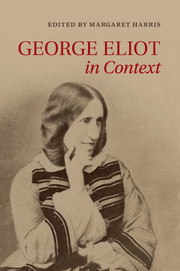Baker, William, George Eliot and Judaism (Universität Salzburg: Institut für Englische Sprache und Literaturen, 1975).
Carroll, David, George Eliot and the Conflict of Interpretations (Cambridge University Press, 1992).
Cheyette, Bryan, Constructions of ‘The Jew’ in English Literature and Society: Racial Representations, 1875–1945 (Cambridge University Press, 1993).
Cunningham, Valentine, Everywhere Spoken Against: Dissent in the Victorian Novel (Oxford: Clarendon Press, 1975).
Himmelfarb, Gertrude, The Jewish Odyssey of George Eliot (New York: Encounter Books, 2009).
Hodgson, Peter C., Theology in the Fiction of George Eliot: The Mystery Beneath the Real (London: SCM Press, 2001).
Jay, Elisabeth, The Religion of the Heart: Anglican Evangelicalism and the Nineteenth-Century Novel (Oxford: Clarendon Press, 1979).
Knight, Mark and Emma Mason, Nineteenth-Century Religion and Literature: An Introduction (Oxford University Press, 2006).
Lovesey, Oliver, The Clerical Character in George Eliot’s Fiction (Victoria, BC: ELS Editions, 1990).
Nurbhai, Saleel and K. M. Newton, George Eliot, Judaism and the Novels: Jewish Myth and Mysticism (Basingstoke: Palgrave Macmillan, 2002).
Qualls, Barry, ‘George Eliot and religion’, in George Levine (ed.), The Cambridge Companion to George Eliot (Cambridge University Press, 2001), 119–37.
Ragussis, Michael, Figures of Conversion: ‘The Jewish Question’ and English National Identity (Durham, NC: Duke University Press, 1995).
Semmel, Bernard, George Eliot and the Politics of National Inheritance (Oxford University Press, 1994).
Shaffer, Elinor S., ‘Kubla Khan’ and The Fall of Jerusalem: The Mythological School in Biblical Criticism and Secular Literature, 1770–1880 (Cambridge University Press, 1975).
Wiesenfarth, Joseph, George Eliot’s Mythmaking (Heidelberg: Carl Winter Universitätsverlag, 1977).



